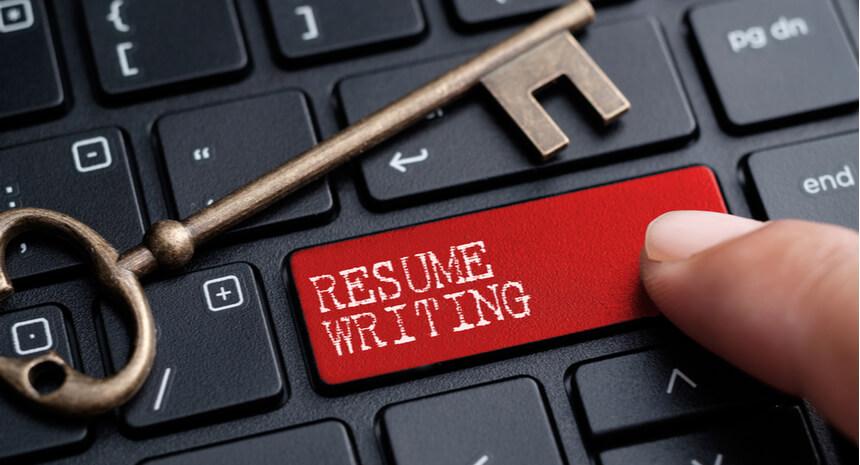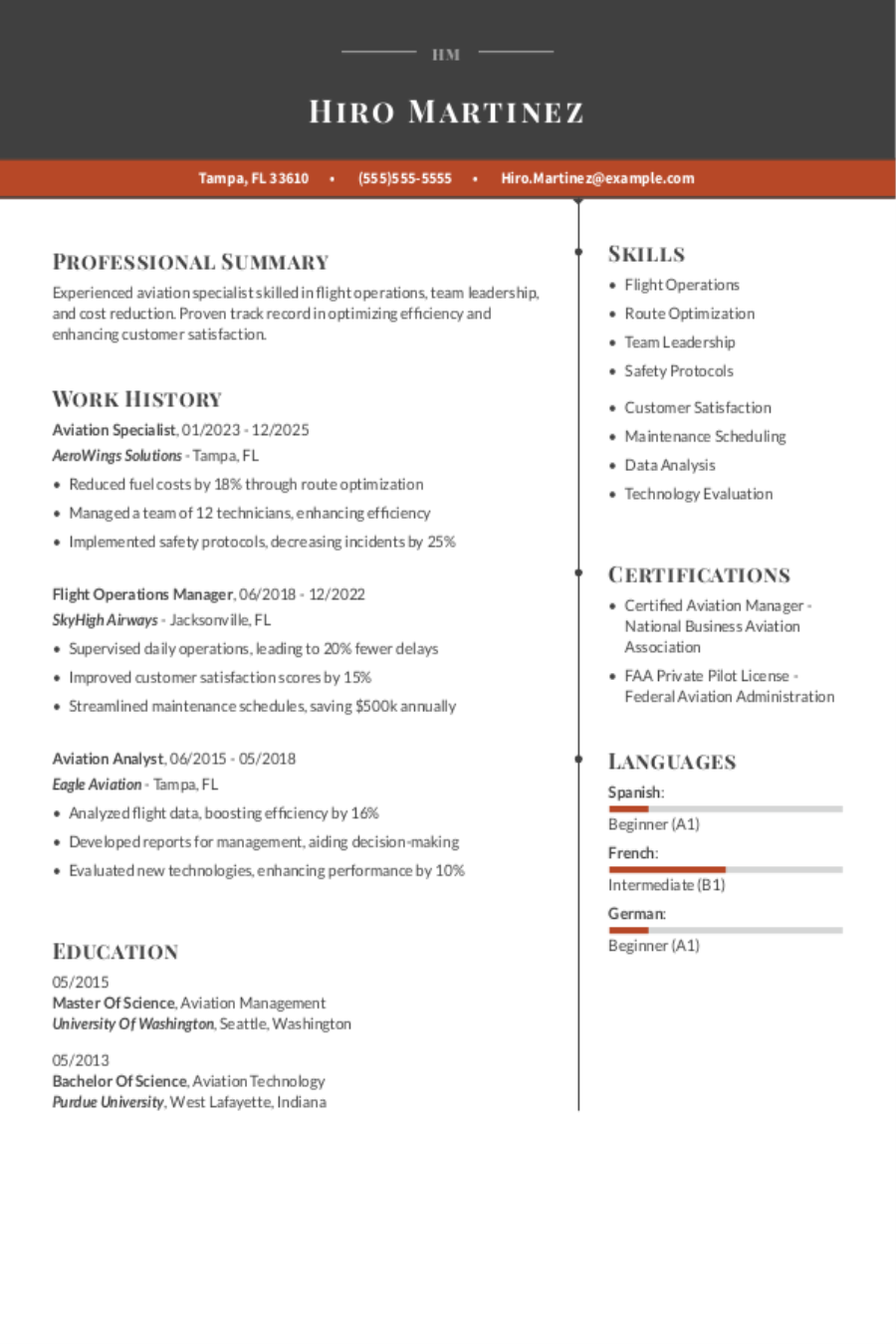Table of contents
Few careers unfold in a perfect straight line. No matter how many detours lead you down the road to your current career, your resume should be your place to tell your unique career story with pride. Our guide will help you do it by discussing how to describe career changes on your resume and how to prepare your resume for a new career path.
Our guide will cover:
- Resume formats you should consider when building a career change resume
- How to use transferable skills to make your unique history feel relevant to any role
- How to discuss career changes in each section of your resume
- A sample resume featuring a major career change
Ready to update your resume for a new opportunity? Use our AI Resume Builder to build or update your resume quickly and easily. With AI-powered content suggestions to help you express your qualifications and ready-to-use resume templates, you'll be ready to submit an interview-winning resume in minutes.
What Resume Format Is Best for a Career Change Resume?
Maybe you're thinking of updating your resume to target a new field where you have no experience, or maybe you're thinking of building a resume for a role in your current field, but the thought of wrangling your complex career history gives you hives; no matter what the situation is, getting your resume organized will give you a strong starting place.
For this, you need to choose a resume format that puts your best foot forward. For career changers, the combination format is usually the best option. Here's a quick rundown of the main resume formats and how they can help you navigate your career change:
- As mentioned above, the combination format is often the best choice if you're preparing for a career change because it offers versatility and balance. Combination resumes give equal weight to skills and experience and are flexible enough to allow you to highlight your past experience while focusing on how that experience contributed to your relevant transferable skills.
- Traditionally, resumes use the chronological format because it places experience front and center and makes it easy for recruiters to skim through your career history. This is great for candidates with a straightforward career trajectory, but it may not work if you're transitioning to a career where you have little experience. Focusing too much on experience when it isn't the strongest point on your resume can be a mistake.
- If you have little experience overall or no relevant experience in the field that you're entering, a strong alternative option is the functional resume format. This format focuses on skills, so you can make your transferable skills the highlight of your resume.
How to Use Transferable Skills to Enhance a Career Change Resume
If you're pivoting into a new career path or seeking to leverage existing experience in a different field, displaying transferable skills is essential.
Transferable skills are skills that carry over from one career to another. Often, they will be soft skills, such as time management, organization, interpersonal abilities, and problem-solving.
Transferable skills can also be more technical. Broad knowledge of technologies like Excel and PowerPoint is relevant across many fields, as are business expertise, accounting skills, data management, and scheduling.
So, how do you know which transferable skills apply to your new role? Start with the job listing. Look for keywords that describe the responsibilities of the role. Your previous experience may not line up exactly with the niche expertise in the job description, but you'll surely find some soft skills that match.
Still not sure which skills from your previous roles will transfer to your new career path? Ask ChatGPT for resume help! AI can help with your resume in lots of ways. Just be sure to fact-check its answers and avoid replacing your unique voice with AI-generated content. If you'd like resume-specific AI help, try our Resume Skills Section Generator. This tool will create a list of skills based on the job title you're seeking.
How to Discuss a Career Change in Each Section of Your Resume
From your resume profile down to your education, big career changes can feel like a major blocker to getting started on your resume. The good news is—they don't have to be! As long as you're open and honest about your unique circumstances, you can still build a resume where each section shines. Here's how:
Address your unique circumstances up front in your resume profile
Start off your resume with an open approach by writing a brief professional summary that includes the details of your career change. You don't have to dig into the "why" and "how" of your unique path. Instead, succinctly state your previous career and your new path while emphasizing how these career moves have prepared you for the opportunity you're seeking. Here's an example:
Sample professional summary for a career change resume
Detail-oriented and highly adaptable former educator transitioning into project management, bringing 10+ years of experience in classroom leadership, curriculum development, and team coordination. Skilled in strategic planning, stakeholder communication, and deadline-driven execution, with a proven ability to manage multiple projects, coordinate diverse teams, and implement structured workflows.
A professional summary is great for discussing how your past experience will contribute to your next role. However, if your experience doesn't contribute anything to your new role, you may want to focus more on your future goals instead.
In that case, try writing a resume objective for a career change. A resume objective introduces you to employers while describing how you intend to develop and grow in your new field. For many career changers, this type of resume profile will capture what you bring to the new role better than a resume summary.
Here's an example resume objective for a career change
Driven and adaptable professional transitioning from a 10+ year career in education into a collaborative, project-oriented UX design role. Eager to apply strengths in communication, organization, and problem-solving while continuing to grow in a fast-paced, team-driven environment. Seeking a role that offers meaningful challenges and opportunities for long-term development and impact.
Write a skills section that focuses on transferable skills
As we previously discussed, transferable skills are vital to a career change resume. Use them to your advantage with a skills section that looks something like this:
Sample skills for a career change resume
- Project planning & coordination
- Leadership
- Resource management
- Communication
- Problem-solving & adaptability
- Time management
- Conflict resolution
- Decision-making
- Training & development
Make your experience section feel relevant
The ideal experience section should be well-organized and focused on highlighting your impact on past roles. This is important whether you're a career changer or not, but when you do make a pivot, there are a few factors to keep in mind:
- When it comes to your experience section, you'll want to describe each entry in terms of transferable skills and accomplishments that fit in with the role you're seeking.
- Minimize industry jargon related to your prior industry and focus on how each role prepared you for this change. Consider omitting irrelevant experience from the early stages of your career or reducing the real estate that you use to describe roles that don't apply to your current career.
- While experience related to your new chosen career field should be given priority, don't leave unaddressed gaps on your resume. If a role is irrelevant to the career you're pursuing, list it briefly with a short bullet point or two that showcase transferable skills related to your current career path.
Sample experience section for a career change resume
Project Coordinator (Intern) Blue Sea Consulting Firm | May 2025 – Present
- Assist in managing project timelines, deliverables, and stakeholder communications for multiple client initiatives.
- Create detailed project reports using Asana to track progress, resulting in process improvements that culminated in a 22% increase in productivity.
- Led cross-functional teams of educators in developing and executing school-wide improvement initiatives.
- Managed multiple projects, including curriculum updates, extracurricular programs, and technology integration.
- Trained and mentored new teachers, showcasing leadership, training and development, and performance evaluation skills.
Freelance Tutor Self-Employed | January 2016 – March 2025
- Coordinated complex tutoring schedules for 45+ students per month.
- Tracked student process, documenting an overall 33% improvement in grades over nine months.
Wondering what skills and key phrases professionals in your industry prioritize on their resumes? Take a look at our library of resume examples for industry-specific samples that you can use as inspiration as you write your own resume.
Include your degrees and professional training
Even if your college major is no longer relevant to your current career goals, your degree still belongs in your education section and can still be an asset on your resume. If you're concerned about the relevance of your education section, include professional development training, webinars, certificates, and projects related to your current field alongside your degree.
Sample education section for a career change resume
Bachelor of Arts in Education
University of Texas, Dallas
- Project Management Professional (PMP) Certification
Project Management Institute (PMI) | Expected: October 2025 - Certified Scrum Master (CSM)
Scrum Alliance | Completed February 2025
These are the basic sections that most resumes include, but you're not limited to just these! If you have relevant experience, interests, or projects that you'd like to showcase on your resume, just add the section that you need. Projects, hobbies, and volunteer work can be a great way to make up for missing experience in your field.
Sample Career Change on a Resume
Having trouble visualizing a successful resume for a career change? Take a look at this sample resume for inspiration.
Final Thoughts
Making a career change is a brave and exciting move. A varied career history allows you to bring a fresh perspective to your next role. Your career change doesn't have to be a barrier.
If you're struggling to get started on your career change resume, consider using a premade resume template. Professional, ready-to-use templates are flexible and allow you to quickly and easily iterate on your resume so you can adapt on the go.
No matter how you approach resume writing for your career change, the key is to focus on your strengths and highlight relevant skills.
Key Takeaways
Choose a format that highlights your strengths.
For many career changers, the combination resume format offers the perfect level of flexibility, but you shouldn't take our word for it. Check out all three of the common resume formats and decide for yourself which one will work best to tell your story.
Emphasize transferable skills.
When you lack experience in the field that you're applying to, transferable skills are here to save the day! Focus on broad technical abilities and soft skills to show the employer that your past experiences have prepared you for this new opportunity.
Build each resume section to emphasize your adaptability.
From your resume profile to your education, each section should focus on being honest about your circumstances and showing the employer how your unique career path is an asset. You can go above and beyond by including additional resume sections that focus on your projects, hobbies, interests, or volunteer work in your new field.
Resources to Help With Your Job Search
- How Long Should a Cover Letter Be?
- How to Show Promotions on a Resume
- The Perfect Resume: A Detailed Guide (+Examples)
- How Many Jobs Should You List on a Resume?
- How to List References for a Resume With No Experience
- How to Update Your Resume (Guide + Expert Tips)
- How to Prepare for a Job Interview
Was this information helpful? Let us know!
Hailey is a career advice writer dedicated to helping job seekers excel in their careers.
More resources

How to Write a Resume: Guide & Examples for 2026
If you re wondering how to write a resume that grabs attenti...

Summary of Qualifications: 13 Examples for Your Resume
Our guide will help you write a summary of qualifications that...

Architecture Resume: Examples & Templates
As an architect your resume must highlight essential skills l...

Aviation Resume: Examples & Templates
As an aviation professional you need a resume that showcases ...

Advertising Resume: Examples & Templates
As an advertising professional you need a resume that capture...

